|
|
|
Sort Order |
|
|
|
Items / Page
|
|
|
|
|
|
|
| Srl | Item |
| 1 |
ID:
095514


|
|
|
| 2 |
ID:
103767
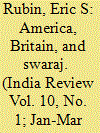

|
|
|
|
|
| Publication |
2011.
|
| Summary/Abstract |
In the years before and during the Second World War, the Roosevelt Administration played an important and often overlooked role in encouraging Britain's disengagement from the Indian subcontinent. Roosevelt's motivations in pressing for Indian independence were varied. They included a mix of principled opposition to colonialism, practical concern for the outcome of the war and pragmatic jockeying for influence with post-colonial nations when the war was won. Churchill's government was wary of being pushed by Washington to move more quickly to "quit India" than it thought prudent. U.S. policy and actions clearly influenced the direction of events toward independence, but U.S. caution as the war ground on led to disillusionment among nationalist leaders. This reaction would have consequences once swaraj was won and India came into its own, at a time when the Cold War was becoming the dominant factor in America's view of the world.
|
|
|
|
|
|
|
|
|
|
|
|
|
|
|
|
| 3 |
ID:
092066
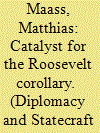

|
|
|
|
|
| Publication |
2009.
|
| Summary/Abstract |
The "Roosevelt Corollary to the Monroe Doctrine of 1904/05" constitutes a landmark in United States foreign policy. However, the 1902/03 Venezuela Crisis-in particular, the arbitration process between the South American country and Germany, Great Britain, and Italy that settled the crisis-led to President Theodore Roosevelt's decision to amend the Monroe Doctrine. The arbitrational award was an important impetus for the corollary because its decision appeared to encourage future European interventions in the western hemisphere. The Roosevelt Corollary was needed to prevent a situation similar to the 1902/03 Venezuela Crisis from occurring again. Strategically speaking, Roosevelt felt the corollary was necessary to uphold the Monroe Doctrine under new circumstances.
|
|
|
|
|
|
|
|
|
|
|
|
|
|
|
|
| 4 |
ID:
175971
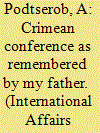

|
|
|
|
|
| Summary/Abstract |
MY FATHER, Boris Fyodorovich Podtserob, was the senior assistant of the People's Commissariat of Foreign Affairs of the Soviet Union during the war. This position allowed him to attend a number of historic diplomatic talks. That is how he came to participate in the Yalta Conference. My father did not leave written memoirs, but he used to tell me about the fateful meeting among three of the world's giants.
|
|
|
|
|
|
|
|
|
|
|
|
|
|
|
|
| 5 |
ID:
095128
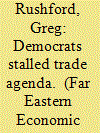

|
|
|
| 6 |
ID:
148174
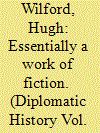

|
|
|
|
|
| Summary/Abstract |
Early in the afternoon of August 26, 1953, a 37-year old CIA officer, Kermit “Kim” Roosevelt, was ushered quietly into Number 10, Downing Street. Led to a living room by a military aide, Roosevelt found the prime minister of Great Britain, Winston Churchill, lying in a bed, propped up by pillows. The veteran PM had recently suffered a stroke and was clearly in bad shape. “He had great difficulty in hearing; occasional difficulty in articulating; and apparent difficulty seeing to his left,”
|
|
|
|
|
|
|
|
|
|
|
|
|
|
|
|
| 7 |
ID:
119928
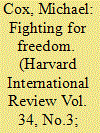

|
|
|
| 8 |
ID:
110457
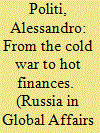

|
|
|
|
|
| Publication |
2011.
|
| Summary/Abstract |
Bush remembers the tragedy of Charles V of Habsburg and Philip II of Spain who strove to keep one world under one sensible hegemony and, despite defeating major adversaries, failed over the stubborn resistance of rebels and heretics then in Holland and yesterday in Iraq - debt and imperial overstretching as predicted by Paul Kennedy.
|
|
|
|
|
|
|
|
|
|
|
|
|
|
|
|
| 9 |
ID:
102028
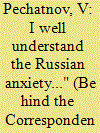

|
|
|
|
|
| Publication |
2010.
|
| Summary/Abstract |
THE WARTIME CORRESPONDENCE between Churchill and Stalin is a well-known and well-studied source on the history of Allied diplomacy. Little is known, however, how these famous messages were written. In my recent article in Russia in Global AffairsI looked at the Soviet angle 1 ; yet even the best Soviet/Russian and foreign specialists on the Soviet-British relations and Churchill have so far passed over in silence much of what was going on behind the scenes in Britain. The specifics of British diplomacy and the Cabinet system of governance, meanwhile, make the British side of the Stalin-Roosevelt-Churchill epistolary triangle especially important.
|
|
|
|
|
|
|
|
|
|
|
|
|
|
|
|
| 10 |
ID:
114662
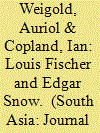

|
|
|
|
|
| Publication |
2012.
|
| Summary/Abstract |
In the absence of direct diplomatic links with India because it was part of the British Empire, President Roosevelt of the United States found means to monitor the political situation there when the Cripps Mission to India of March-April 1942, which offered a small measure of reform, ended in failure as predicted. His 'emissaries' in India, Louis Fischer and Edgar Snow amongst others, uncovered a very different version of the failure of the Cripps Mission. Their articles, published from September 1942 onwards, let their American readers and Churchill's information bureaux know that British propaganda had been shown up for what it really was-a bid to retain British control of India.
|
|
|
|
|
|
|
|
|
|
|
|
|
|
|
|
| 11 |
ID:
144653
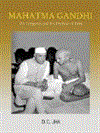

|
|
|
|
|
| Edition |
4th ed.
|
| Publication |
New Delhi, KW Publishers Pvt Ltd, 2014.
|
| Description |
xx, 133p.pbk
|
| Standard Number |
9789383649037
|
|
|
|
|
|
|
|
|
|
|
|
Copies: C:1/I:0,R:0,Q:0
Circulation
| Accession# | Call# | Current Location | Status | Policy | Location |
| 058632 | 923.254/JHA 058632 | Main | On Shelf | General | |
|
|
|
|
| 12 |
ID:
095526
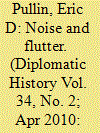

|
|
|
|
|
| Publication |
2010.
|
| Summary/Abstract |
After the Japanese attack at Pearl Harbor, the administration of Franklin D. Roosevelt recognized that India possessed impressive military and industrial capacities, but he concluded that its anticolonial struggle for independence from the British Empire placed those capacities in doubt.1 At the same time, the administration observed an increasing connection between diplomatic goals and information activities.2 Although appreciating the importance of propaganda in international affairs, the administration failed to articulate the role and purpose of American information activities. The failure stemmed in large part from the Roosevelt administration's ambivalence about its policies concerning the British Empire and Indian nationalism. The Office of War Information (OWI), the organization responsible for U.S. propaganda abroad, received precious little direction from Washington concerning strategy or operations in India. Initially left on its own in India, the OWI attempted to generate goodwill by presenting the United States as the world's defender of democracy. Instead, American propaganda fostered suspicion among the British and Indians about U.S. motives. The OWI even confounded American diplomats, such as William Phillips, the second personal representative appointed by President Roosevelt in India, who warned that, "The Indians too may well be wondering whether we Americans are really going to displace the British by turning the attention of Indians to American methods, production and ideals.
|
|
|
|
|
|
|
|
|
|
|
|
|
|
|
|
| 13 |
ID:
121168
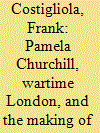

|
|
|
| 14 |
ID:
091278
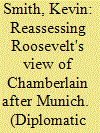

|
|
|
|
|
| Publication |
2009.
|
| Summary/Abstract |
The absence of active Anglo-American cooperation in the late 1930s contributed to an international environment in which Adolf Hitler could maneuver, capitalizing on Neville Chamberlain's zeal for an Anglo-German settlement of outstanding grievances. The reasons for this estrangement included British suspicion of America's power, intentions, and reliability, manifested notably in U.S. rejection of the League of Nations and withdrawal from the 1933 London Economic Conference. British war debt default and failure to coordinate a response in Manchuria angered Americans. Finally, mutual erection of tariff walls and-especially-both peoples' desire to avoid war imposed domestic political constraints.1 Any conventional summary of Anglo-American relations in this era includes reference to the lack of personal affinity between Franklin Roosevelt and Neville Chamberlain. In 1936, Roosevelt had remarked, "We must recognize that he thoroughly dislikes Americans." In December 1937, Chamberlain told his sister, "It is always best and safest to count on nothing from the Americans except words" and advised the cabinet, "the Power that had the greatest strength was the USA, but he would be a rash man who based his calculations on help from that quarter."2 These attitudes were influential. Unpublished private letters from Geoffrey Thompson, an official in the Foreign Office's American Department recently recalled from Spain, to Claude Bowers, U.S. ambassador to Spain, help illustrate the importance of mistrust and the obstacles to a different path in the winter of 1938-1939.
|
|
|
|
|
|
|
|
|
|
|
|
|
|
|
|
| 15 |
ID:
127314
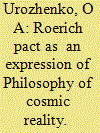

|
|
|
| 16 |
ID:
029421
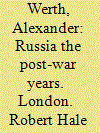

|
|
|
|
|
| Publication |
London, Robert Hale and company, 1971.
|
| Description |
xvii, 446p.Hbk
|
| Standard Number |
0709124414
|
|
|
|
|
|
|
|
|
|
|
|
Copies: C:1/I:0,R:0,Q:0
Circulation
| Accession# | Call# | Current Location | Status | Policy | Location |
| 008251 | 947/WER 008251 | Main | On Shelf | General | |
|
|
|
|
| 17 |
ID:
096464
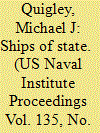

|
|
|
| 18 |
ID:
085129
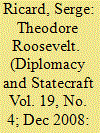

|
|
|
|
|
| Publication |
2008.
|
| Summary/Abstract |
This article argues that as the first modern US president and an innovative shaper of American foreign relations, Theodore Roosevelt launched the rising United States on the world stage as a major actor in power politics, that American diplomacy came of age with him and not with Woodrow Wilson, and that the secular pragmatist who succeeded because he was abreast of the times should not be begrudged the laurels that are so often bestowed on the religious-minded visionary who failed because he was ahead of his time. In American historiography Wilson has often eclipsed-unfairly and erroneously-the geopolitical and diplomatic skills, professionalism and expertise in foreign policy of Roosevelt. Even as ex-president, Roosevelt would be a force to be reckoned with. The use and misuse of a misconstrued legacy that some have tried to confiscate for their own benefit is perhaps best illustrated by presidential candidate John McCain's reverential claim that he is "a Teddy Roosevelt Republican" rather than a neo-Wilsonian.
|
|
|
|
|
|
|
|
|
|
|
|
|
|
|
|
| 19 |
ID:
122913
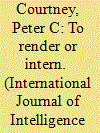

|
|
|
|
|
| Publication |
2013.
|
| Summary/Abstract |
On 28 May 2009, the Los Angeles Times reported that the United States Department of Justice and the Federal Bureau of Investigation (FBI) planned to significantly expand their role in global counterterrorism operations, as part of a policy shift that would replace the Central Intelligence Agency (CIA)-dominated system of clandestine detentions and interrogations with one built around transparent investigations and prosecutions. This new "global justice" initiative has created a more central role for FBI agents in overseas counterterrorism cases, and harkens back to the FBI's Special Intelligence Service (SIS). In 1940, President Franklin D. Roosevelt had requested the creation of the SIS that served as the Bureau's foreign intelligence and counter-subversive wing in Latin and South America until its disbandment in 1947.
|
|
|
|
|
|
|
|
|
|
|
|
|
|
|
|
| 20 |
ID:
091921
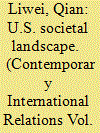

|
|
|
|
|
| Publication |
2009.
|
| Summary/Abstract |
Barack Obama became the first African American president calling for change. He is not only faced with serious challenges on the economic and financial fronts, but also has to deal with a variety of major social problems which will potentially reshape American society in the 21st century; increasing economic inequally, complex race relations, an unsustainable healthcare burden and a weakening education system.
|
|
|
|
|
|
|
|
|
|
|
|
|
|
|
|
|
|
|
|
|